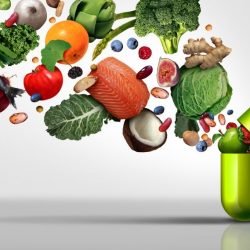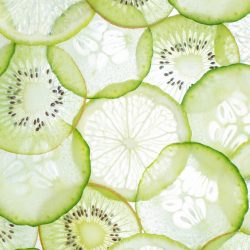Bloating, nausea, gas, constipation, diarrhea… so many ailments that are indicative of poor digestion or medically called dyspepsia . On the shelves of organic stores and pharmacies abound various food supplements to facilitate digestion . Which one to choose ? Before supplementing, it is necessary to identify the cause and target the symptom(s).
What is digestion?
Digestion is a biological process responsible for transforming food into assimilable nutrients :
- The proteins
- Carbohydrates
- Mineral salts
- Lipids
- Other assimilable substances
These nutrients also pass through the intestinal wall to enter the bloodstream.
Roughly, we can define digestion in 4 stages:
-
Chewing:
The first stage takes place in the mouth, the grinding of food coming into contact with saliva allows the chemical degradation of food starch to begin thanks to amylase (digestive enzyme produced by the salivary gland).
-
Gastric digestion:
The second step is located primarily in the stomach, this step is essentially chemical. In the stomach, the food, reduced to a pulp thanks to peristaltic movements, will promote the action of the gastric juice which makes it possible to degrade the proteins.
-
Intestinal digestion:
In the intestine, these foods continue to be degraded by digestive juices coming from the pancreas and the gallbladder. The intestines continuously contract and relax; these movements are controlled by the nervous system which slows down or speeds up digestion , this allows the chyme (name of food once crushed) to be sent to the anus.
-
Colonic digestion:
The colon is an area for storing and collecting water. At this stage, only dietary fiber remains, parts of cereals, fruits and vegetables that we do not digest. These undigested residues will be supported by the abundant bacterial population of our colon. This is home to several tens of billions of microorganisms. This bacterial flora is divided into two categories: the flora of fermentation and the flora of putrefaction.
Digestion ends when stool is passed.
Listening to your body to decode the signs of poor digestion
This is the first step to follow when you want to treat your digestive disorders . Indeed, each evil is indicative of an imbalance, each sign is important to understand where the dysfunction comes from and why. It is important to observe if the digestive disorders are associated with the consumption of one or more specific foods, at what time of the day, what are the accompanying symptoms, the sensations felt, where?
Digestion is a complete process . If during one phase there is a malfunction, all the other stages will be altered, creating various disorders that can be embarrassing or even painful.
Bloating:
If the feeling of bloating occurs after eating, it may be the cause of too rapid ingestion of food which is then not ground enough. These foods that are too large for the stomach accompany a feeling of heaviness and promote aerophagia. Food (too rich, raw vegetables, cereals, pulses, etc.) as well as stress can also be the cause.
Constipation:
It is caused in most cases by a slowing of transit due to a diet low in fiber, a lack of hydration. Constipation can be a collateral damage related to stress, as explained above the nervous system controls the speed of digestion, an emotional disturbance can then create digestive disorders .
Diarrhea:
It can be caused by a food intolerance (lactose, gluten.), by too rapid intestinal transit, a lack of hydration in the stools and also in the same way as constipation by stress.
Postprandial fatigue:
When it is not daily, it is very often associated with too large meals, digestion will be long, the body will need energy to digest foods that are too rich. Another cause, it can be linked to hypoglycemia, yes, even when leaving the table ! The functioning of the human body can sometimes seem inconsistent… Indeed, when you have eaten a lot, your blood sugar level jumps to unsustainable levels for the body. This peak in blood sugar will rise if your meal is rich in carbohydrates (bread, pasta, potatoes, pastries, sugary drinks, etc.) which are easily transformed into glucose, which will pass into your blood.
Too much glucose in the blood is nevertheless dangerous, the body lowers blood sugar by secreting insulin. It will order the cells of the body to absorb the excess sugar present in the blood to stabilize blood sugar. This is how the blood sugar level goes down. Only, the upheaval caused by the spike in blood sugar due to food that is too rich in carbohydrates will encourage your body to produce an exaggerated amount of insulin. Too much insulin will cause your blood sugar to drop excessively , resulting in a hypoglycemic attack. This is called reactive hypoglycemia .
Which food supplement(s) to choose to relieve digestive disorders?
When digestive disorders are occasional, but nevertheless bothersome for you, there are a multitude of natural remedies that can relieve you.
To relieve bloating:
Activated charcoal will regulate transit, absorb toxins and trap excessive gas. You can consume it alone in capsule or combined with other active ingredients known for their action on digestion and intestinal transit (such as Herbesan Carbogaz for example ).
The aloe vera :
It will be your ally in case of digestive disorders, such as constipation, diarrhea, acid reflux and heartburn. Enriched with mucilage, aloe vera protects the digestive wall, it regulates transit thanks to its anti-inflammatory action. You can find it in the form of sticks , easy to take and carry.
In case of diarrhoea:
Ultra ventilated green clay is ideal. It will act as a bandage by absorbing toxins and regulating transit. You just need to infuse a little green clay in a glass of water, if possible let it steep overnight before drinking it.
For a more general action on the digestive system , consider using plants! A mixture of Lemon Balm-Milk Thistle-Turmeric EPS will have a protective, anti-inflammatory and nerve-calming action on the digestive tract. On the same principle, but with other plants, a Boldo-Mauve-Oregano EFGM (Extract Fluid Glycerine Honey) mixture will facilitate digestion, calm spasms and promote transit. 5ml to be taken in a large glass of water once a day for 1 month will help you regain your intestinal comfort.
To facilitate digestion and avoid this feeling of heaviness and fatigue, we recommend consuming infusions of plants known for their action on the intestinal sphere after each meal (). According to Ayurvedic medicine, hot water is an excellent remedy, it helps prevent constipation, promote digestion, avoid fatigue and hydrate the tissues, combined with the active principles of plants, it makes a good remedy preventive.
Some plants to have in your cupboards to make an emergency remedy
The microbiota also has an important role to play in digestion . The bacteria that make up the intestinal flora play a fundamental role in maintaining our balance. Established in an ecosystem, they produce substances that are beneficial for the proper functioning of the body. They help in the degradation of certain absorbable substrate molecules, they protect against the proliferation of germs which could be harmful, they produce enzymes, vitamins and fuels for the cells of the large intestine.
An imbalance of the intestinal flora can cause many disorders , bloating, diarrhea, vomiting… It is then essential to recreate this flora using probiotics, which will act by strengthening the natural bacteria present in the body. The Pileje laboratory has developed a whole gram of probiotic with different strains of bacteria, each with their own specificity, for example to find digestive comfort with the microbiotic strains contained in Lactibiane reference . To completely reseed the flora, take a 3-month cure of probiotics to enjoy the long-term benefits.







